David Nucifora says the relationship between the IRFU and the four provinces hasn't been damaged by the recent Emerging Ireland tour of South Africa, but admits it caused "robust discussion" between the parties.
The three-game South African tour saw the provinces stripped of a combined 34 players for multiple rounds of the BKT United Rugby Championship earlier this season, while the short notice of the trip is also believed to have rankled the provincial coaches.
Nucifora, the IRFU's performance director, has defended the project, but admits there was some "friction" over the tour.
"Damage? I don't think it did any damage. I think what it did was create a lot of robust discussion," he said at a briefing at the Aviva Stadium yesterday.
"You've got to understand the pressure the coaches work under. They're tasked with a certain goal, and an outcome they are trying to achieve. We are as well."
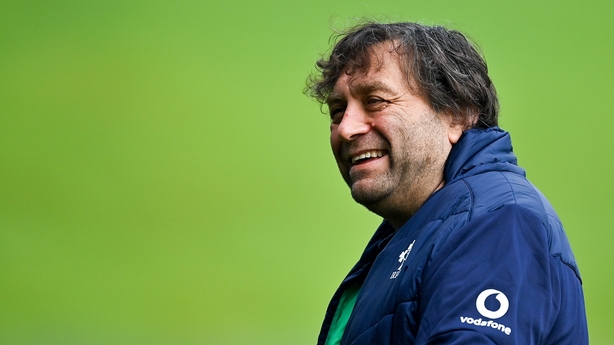
The Australian (above) says it's likely there will be similar projects in the future, with he and the Irish coaching staff determined to establish their "Top 50" players in the long term, while also looking to get more minutes into young players, who could otherwise lose out due to the short URC calendar.
And although it's not always ideal for the provinces, he says he welcomes the "friction" that can arise.
"We're all one, but we have different drivers. The best high-performance model has friction. If you don't have friction, then you're not going to advance, evolve and get better. There's lots of friction that goes on. You guys hear about some of it. You don't hear about all of it. But it's healthy friction.
"It's friction, debate, robust debate. It's about what we see as good, and what we see as needs to be done. That happens all the time, and it has to happen. If that stops happening, then Irish rugby will plateau and, at worst, it might start to go backwards. I think that's a really positive part of this model. I'm not going to shy away from the fact that it happens, we're not worried about the fact it happens. I see it as a really essential part of a healthy system."
Nucifora also claims the Irish system is the envy of other nations.
"At the moment, there are a lot of our competitors that are incredibly envious and jealous of the model that can exist here.
"It comes with that type of challenge. But I'd much rather have that than what most of our competitors have, and to work in the landscape they've got.
"You've just got to have the appetite to do it, and the people in it that can have that debate. And you dust yourself off at the end of it and you get on with it, and that's what happens.
"You might have a day were you are a bit cranky, but you get back to work and you're working with all the same people. And you just get on with it. And they're all like that. So, we're lucky that we have 'robust' in our system."
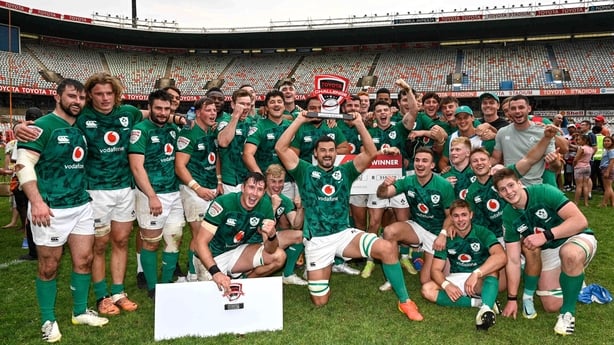
If the Emerging Ireland tour is a sign of things to come, it raises the question of potential difficulties in recruiting and retaining the best coaches for the provinces in the future, over fears of how much autonomy they would have over their own teams.
But Nucifora rejects the suggestion that the IRFU's influence over their four URC sides would limit their ability to both bring the best coaching talent to Ireland and keep it here.
"I don't think so. Don't misunderstand the autonomy that they have currently to do what they want. They're supported significantly through the Irish model, be it financially and the way it's contracted and everything else, so they have a lot of stability that English clubs don't have because of the way the model works.
"I'm sure there are days where they don't want to be part of the IRFU, when they want to run their own race in totality, but I bet you there's more days when they're more comfortable being where they are now.
"I don't think, in the here and now, that that's a risk at all [losing coaches]. I think, because we've got four really strong Irish teams we're never going to be in a position, if we keep doing our job well, that people won't want to be part of the system.
"You come into this model with your eyes open too so for the guys that are foreign coaches who come into it, they understand that, 'OK, this is how we work here'.
"If you don't want to be a part of it then you don't have to come, you don't have to put your hand up for the job, but if you're an Irish coach, you fully understand, and I think you take that on board.
"There are days when it works in your favour and there are days when you'd say, 'Jeez, I wish it was a bit different'."
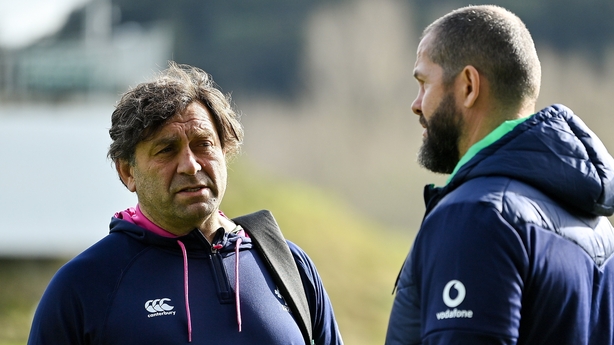
With head coach Andy Farrell (above right) agreeing a new contract earlier this year to keep him in the job until the summer of 2025, Nucifora confirmed discussions are also taking place with his backroom team about extending their deals.
And while he is confident the IRFU can keep the current coaching ticket in place, he believes they will always be well-equipped to attract coaching talent to Ireland.
"It’s important, but again, everyone has different decisions to make based on different things in life. Their job is only one of them.
"Look, I would be confident that we will retain that group, but I couldn’t guarantee you that at the moment. And if that didn’t happen, would I be worried about that? I would be disappointed, but I wouldn’t be worried.
"One of the benefits of having a really robust system is that everyone’s really curious about what we’re doing and how we’re doing it. Because they’re curious, when we put an ad in the paper for whatever – a nutritionist, a physio, a coach – the change in the last five years about the global interest in wanting to work in this system is enormous. So people want to be a part of this at the moment because they think we’re doing it OK.
"In the same way you guys have written about Stuart [Lancaster] going away over to Racing, there will be plenty of people wanting to get in that space. Why? Because it’s successful, they see it as a good system, a good model. You’re not short of applicants when that happens and that’s the benefit of the whole system doing well," he added.
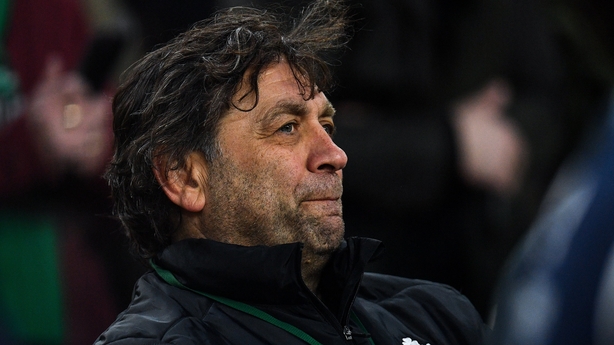
Could Irish rugby experience similar financial difficulties to Worcester and Wasps?
"I can't give you numbers. There's probably a financial result coming out some time soon. All I can say is we've gone through an unbelievable period that Covid has imposed on sport and society, and we've come out the other end.
"Not only have we come out the other end and we're still here and reasonably strong, but throughout that period we've also managed to maintain the momentum in our game, in our model, of player production and player performance.
"I think that happens because a lot of people contribute to the decision making and the structure of what goes on, on and off the field. So I'd rather be in our shoes than a lot of our other competitors’ shoes."
Could the Women's XV players who turn down contracts fall down the pecking order?
"How big a risk is it? Well, you'd think over time they will fall behind, and I say that because I'd back our full-time programme to be pretty good and over time you'd have that expectation.
"But in saying that, the opportunity for that person to be able to work, play rugby and get supported, that's challenging but it's nothing different to what our Olympic athletes do. I keep coming back to that. They have that choice.
"We've tried to create a model of choice and it was never going to be perfect and it was never going to suit everyone but there are a number of different parts to it that give people choice, and I think that was the best we could do to be able to put it together in that manner.
"So no-one will be penalised for being or not being anywhere, but it will all come down to what it always comes back down to, and that's performance."
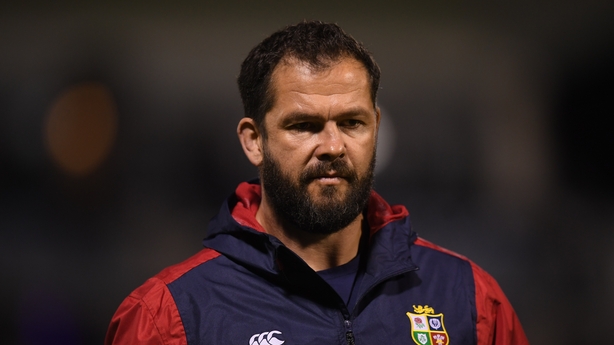
Andy Farrell to coach the British and Irish Lions in 2025?
"We've done it [his contract] in such a way to have another couple of years of continuity.
"It does tie in with a Lions year, and we'd be ecstatic if Andy was the Lions coach, we think that that would be fantastic.
"If he gets offered that job and chooses to take it, we'd be fully supportive of him because for us that's part of the growth of the game here.
"So, there are things that would be assessed along the way. We feel that we've got a world-class head coach, a really good coaching ticket that supports him and we'll be working to try and secure them for as long as we can."
One more year for Johnny Sexton?
"Look, he's obviously fully focused on what’s in front of him and I wouldn’t have that conversation with him now to distract him in any way, shape or form. So, he’ll make a decision.
"We’ve gone in short bites with him over the last couple of years, it was a strategy that he and I agreed on to say, 'Righto, let’s just see how it goes, see how you feel, see what your body is like, see how you’re playing’.
"I think that’s actually suited him, to take a bit of pressure off in the fact that he’s comfortable with where he’s at, and that’s been reflected in how he's playing."
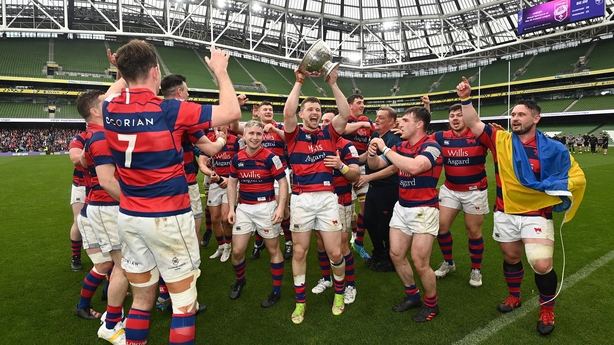
How does the All-Ireland League fit into developing Irish talent?
"It is what it is now. It will always have a purpose because it houses a lot of younger players to be able to give them that game time. It sits in that pathway, and serves that pathway now for developing players through that NTS [National Talent Squad] academy space and they go back and they get a good chunk of their game time in that.
"Realistically, do I see that massive evolution of the role of the club game is going to change if looking five years, 10 years down the road? I don't. Not everyone will like that, because historically it has had an elevated importance going back a number of years now.
"But it will always have an important role, it just won’t be at the elevated level as it was before the provinces. That’s not demeaning it in any way, it’s just a fact. It’s part of life and things roll on and things change.
"But it’s important, it plays a huge role in the success that we have had in that pathway space and what it does for those young guys. And we desperately want to keep it healthy."
Is a fifth Irish professional team a possibility in the future?
"I think down the track you've got to look at everything. Some of them are obviously more feasible than others and there's a financial attachment to it.
"It's not cheap to run one of these professional teams. I think at the moment, four teams, it works, but we've probably got to be smarter with how we work with the four teams.
"Does it rule out that you'll never have a fifth team? I don't think so. You've got to keep that on the table, but at the moment I think you've got to look at the model and how that can be adapted and manipulated because everything we do has to be financially sustainable as well - and that's the other part as well.
"The alignment that we get out of the Irish model is its aligned and it gives you operational sustainability but it also gives you financial sustainability and that always has to be top of the list.
"We've got to be able to afford what we do."
Listen to the RTÉ Rugby podcast on Apple Podcasts, Soundcloud, Spotify or wherever you get your podcasts.
Watch Munster v Ulster and Ospreys v Connacht in the BKT United Rugby Championship on Saturday 29 October from 4.45pm on RTÉ2 and RTÉ Player.
Listen to live commentary of Munster v Ulster on Saturday Sport on RTÉ Radio 1, or follow our live blog on RTE.ie


